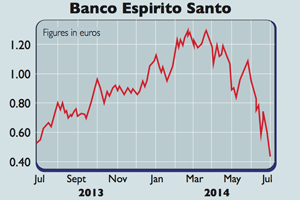
Sliding eurozone markets, fears over the solvency of banks and countries – “it feels just like 2012 again”, says Raoul Ruparel in Forbes.
Late last week, Banco Espirito Santo (BES), Portugal’s biggest bank, saw its share price plunge when it emerged that its parent company, Espirito Santo International (ESI), had failed to pay the interest on some of its debts.
The complicated ownership structure left investors worried about the extent of BES’s exposure – so they sold first and asked questions later.
As the mood soured, a Spanish bank shelved a bond auction, while a Greek government bond auction proved less successful than expected. The markets’ biggest fear about the eurozone during the crisis – that bust banks would in turn bankrupt their national governments – had flared up again.
While Portugal’s government should be able to cover BES’s €920m exposure to ESI if it needs to bail it out, it “could ill afford a widespread bank rescue”, reckons Capital Economics. High unemployment and the weak economy also suggest there could be more bank losses to come in future.
Yet by early this week the wobble was over. BES “is far too small to have any systemic impact itself”, said Morgan Stanley’s Hans Redeker, and the turmoil at the overcomplicated holding company – where accounting irregularities have been discovered – appears specific to this bank.
Portugal does have long-term woes, but this particular group’s troubles “are not fundamental”, says Vincent Chaigneau of Société Générale. This is “more about investors getting cold feet with yields so low and risk assets so rich”.
It also suggests that the European Central Bank’s (ECB) year-long audit of bank balance sheets is having a positive impact. The so-called asset quality review, to be published this autumn, is supposed to allay fears that European banks (unlike their UK and US counterparts) are still hiding their losses.
The ECB reportedly told the Portuguese authorities that complex shareholdings “might be the type of thing to fall foul of its review”, says Iain Dey in The Sunday Times.
If this is a result of the review, it’s good news. Previous audits have been toothless, so a more convincing one would boost confidence in European banks over the long run. But it does imply further jitters in the short term as once-hidden losses see the light of day.